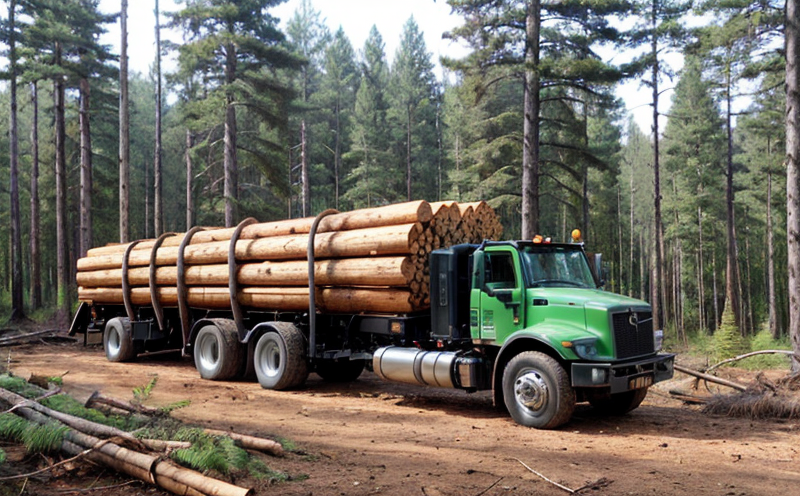Veneer Thickness Measurement Testing
Understanding veneer thickness measurement is crucial in forestry products testing. Veneer, defined as a thin layer of wood sliced from a log or plank, plays a significant role in the production of high-quality wooden materials used in various sectors such as furniture making, flooring, and construction.
The accuracy of veneer thickness measurement directly impacts the quality of end products. This is why precise testing methods are essential to ensure that manufacturers meet specific industry standards. The process involves measuring the exact thickness of veneer slices using specialized instruments like micrometers or ultrasonic sensors.
Forestry products, especially those requiring veneer layers, need to adhere to strict specifications set by international standards such as ISO 14637 and ASTM D243. These standards provide guidelines on how veneer should be prepared, measured, and inspected to ensure consistency and quality across the industry.
For instance, when preparing a specimen for measurement, it is essential to cut or slice the wood in accordance with specified dimensions. The testing process typically involves multiple steps: first, the specimen is carefully trimmed; second, it undergoes conditioning to equilibrate moisture content; third, precise measurements are taken using calibrated instruments.
The importance of this service cannot be overstated, particularly for quality managers and compliance officers who are responsible for ensuring that products meet regulatory requirements. R&D engineers also benefit from accurate veneer thickness testing as they can refine their processes to enhance product performance and durability. Procurement personnel can leverage this expertise to select high-quality raw materials, thereby improving the overall competitiveness of their organizations.
By investing in precise veneer thickness measurement tests, businesses not only maintain compliance but also gain a competitive edge by producing superior quality products that meet customer expectations.
- Precision: Ensures accurate measurements leading to consistent product quality.
- Compliance: Adherence to industry standards like ISO 14637 and ASTM D243.
- Durability: Enhanced through refined manufacturing processes based on accurate testing results.
- Customer Satisfaction: Superior products meet or exceed customer expectations, leading to repeat business.
In conclusion, veneer thickness measurement is a vital aspect of forestry product testing. Its precision, compliance with industry standards, and impact on product durability make it an indispensable service for quality managers, compliance officers, R&D engineers, and procurement personnel. Investing in this service ensures long-term success in the competitive world of forestry products.
Why Choose This Test
Choosing veneer thickness measurement testing is a strategic decision that offers numerous benefits for businesses operating in the forestry sector. The accuracy of this test ensures that products meet international standards such as ISO 14637 and ASTM D243, which are essential for maintaining compliance with industry regulations.
The precision of this service also contributes significantly to enhancing product durability. By ensuring consistent veneer thickness, manufacturers can produce high-quality finished goods that better withstand the rigors of use, leading to increased customer satisfaction and loyalty.
For quality managers and compliance officers, investing in this testing ensures continuous adherence to industry standards. This not only helps avoid potential legal issues but also enhances a company's reputation for reliability and integrity.
R&D engineers benefit from precise veneer thickness measurements as they can refine their processes to enhance product performance and durability. This leads to innovation in forestry products, which is crucial for staying competitive in the market.
Finally, procurement personnel can leverage this expertise to select high-quality raw materials, thereby improving the overall competitiveness of their organizations. By ensuring that only top-tier raw materials are used, businesses can produce superior products that meet or exceed customer expectations.
International Acceptance and Recognition
Veneer thickness measurement testing is widely recognized and accepted in the forestry sector due to its critical role in ensuring product quality and compliance with international standards. Many reputable organizations, including ISO and ASTM, have established guidelines that manufacturers must follow.
The use of these internationally recognized standards not only ensures uniformity across different regions but also fosters trust among customers who rely on consistent product performance. By adhering to these standards, forestry businesses can demonstrate their commitment to excellence and reliability.
Furthermore, compliance with international standards is essential for market access in many countries around the world. Many governments have implemented regulations requiring that products meet specific quality criteria before being allowed into local markets. By ensuring that veneer thickness measurements are accurate, manufacturers can avoid costly delays or rejections at customs checkpoints.
The widespread acceptance of this testing method also contributes to environmental sustainability by promoting responsible forest management practices. Through precise measurement and consistent monitoring, forests can be managed more efficiently, leading to long-term ecological benefits.
Competitive Advantage and Market Impact
In today’s competitive marketplace, having a reliable veneer thickness measurement testing service is essential for gaining a competitive edge. By ensuring that products meet the highest quality standards, businesses can differentiate themselves from competitors who may not have invested in similar services.
The precision of this test ensures that every product meets or exceeds customer expectations, leading to higher levels of satisfaction and loyalty. This, in turn, translates into increased sales and repeat business for manufacturers who consistently deliver superior products.
Moreover, adhering to international standards such as ISO 14637 and ASTM D243 demonstrates a company’s commitment to excellence and reliability. This can significantly enhance the reputation of the organization among customers, partners, and stakeholders alike. A strong reputation is key to building long-term relationships and fostering trust within the industry.
The impact of this service extends beyond just individual companies; it also contributes positively to the broader forestry sector by promoting best practices in product development and production. By setting high-quality benchmarks, businesses can inspire other players in the market to adopt similar standards, ultimately raising the overall quality levels across the entire industry.





